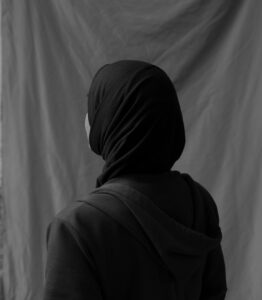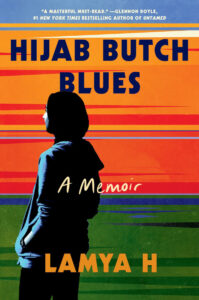The PEN Ten: An Interview with Lamya H
Lamya H set out to write a memoir that was unapologetically queer and unapologetically Muslim.
In Hijab Butch Blues (Dial Press, 2023), Lamya explores the lives of Prophetic figures from the Quran, contrasting their lives with her own as she reckons with love, gender, prejudice, justice, and resistance.
In conversation with World Voices Festival Associate Director Sabir Sultan for this week’s PEN Ten, Lamya provides an inside look at how her intimate memoir came to be (Amazon, Bookshop).

1. Many memoirs exploring queerness and faith often navigate an opposition between the practitioners and/or tenants of the faith and queerness. However, in Hijab Butch Blues, your reflections on your faith, and Quranic stories, provide a launching pad for several key moments of your understanding of and growth into your queerness. When first conceiving of writing your memoir did you have in mind the conventions of the genre and the expectations you might be writing against? Did they impact the way you wanted to share and shape your story?
I couldn’t have written a memoir that was based on opposition – or even reconciliation – of queerness and Muslimness because that isn’t how those identities have played out in my life. Both are identities that I’ve had to grapple with: I had to learn to navigate hegemonic gay spaces and figure out how to live my own version of queerness, just like I had to learn to read the Quran in anti-oppressive ways and live my own version of Islam. But also, both identities are really important to me and I’ve grown into both simultaneously. Both have always been a big part of how I see the world and are intimately intertwined with each other. And so when I was writing Hijab Butch Blues, I wanted to write a book that was unapologetically queer and unapologetically Muslim. It felt important to start with stories from the Quran because these have always been such a big part of my life – as parables, as lessons, as metaphors.
2. Throughout your memoir you retell stories from the Quran, juxtaposing them with your own life, as you explore their teachings. What was the effect of retelling these stories? Did the act of rewriting them change your relationship to the stories?
I’ve always conceived of figures from the Quran as messy and complicated and deeply human, but retelling the stories and the act of trying to get in their heads gave me even more empathy for them. For example, I’ve always thought of Musa (Moses) as being a little arrogant. There are a lot of stories in the Quran where he doesn’t come off the best – in one story, he asks to see God, which I’ve always found so presumptuous. In another story, God assigns Musa a task and he asks if he can bring his brother. But when I was writing about Musa, I researched his story and read about how he had a stutter. This made me so sympathetic to him – of course he wanted to bring his brother along, he was afraid that people wouldn’t understand him, or even worse, make fun of him. And of course, when you extend empathy to others, it allows you to extend empathy to yourself. Writing the stories of these figures from the Quran helped me be more empathetic towards the parts of myself that I’ve been embarrassed or angry at. Like Musa, I too am allowed to be messy and complicated and deeply human.
“I’ve always conceived of figures from the Quran as messy and complicated and deeply human, but retelling the stories and the act of trying to get in their heads gave me even more empathy for them.”
3. When discussing coming out to an old friend you write, “I’ve learned to reframe telling people as inviting in, instead of coming out–inviting into a place of trust, a space for building.” I loved this approach. Often the narratives around coming out focus on public declarations, not making space for the danger, vulnerability and the barriers of cultural translation that sharing one’s queerness can entail. How did the framing of “inviting in” come to you?
Even as celebrities and mainstream media and sometimes even my friends were touting the importance of coming out, I knew that the concept didn’t quite work for me. The framing of “inviting in” isn’t mine, it’s something that a lot of queer folks of color have talked about, especially in the early 2010s when the “It Gets Better” campaign was happening, when a lot of the discourse around coming out was about how you need to do it, how visibility will change the world, how the only way to be gay is to be out. One person who was writing about the “inviting in” reframing was Darnell Moore. I read early versions of his essays and they upended my entire conception of coming out. I had never thought so intentionally about this idea of inviting people into a circle of trust, about how I could choose to tell people about my queerness on my own terms. I’m forever grateful to all the QTPOC (Queer and Trans People of Color) grassroots organizing that I was lucky to be a part of in my early 20s and where these ideas were being disseminated. And I’m forever grateful for all the writing that clarified and archived these ideas.
4. Writing is often a private and intimate process. On February 7th, 2023, Hijab Butch Blues will also belong to readers. How do you prepare for that?
I’m terrified! Writing is such solitary work: the process of unearthing and reflecting on the memories in my book was done entirely on my own, and while I was writing this incredibly intimate memoir, I forgot that it’ll eventually go out into the world. I hadn’t even thought to prepare for it until my friend Una Osato mentioned the concept of aftercare – the idea of intentionally taking care of yourself after you’ve been vulnerable. Some of my aftercare activities will include: spending time with friends who nourish me, working out, and committing to not reading negative comments on the internet.
5. In the memoir you posit writing as a place of resistance where you can fight for your beliefs. What do you hope your book will do in the world? How can writers affect resistance movements?
I see writing as a form of resistance. My favorite encapsulation of this is Teju Cole’s tweet: “Writing as writing. Writing as rioting. Writing as righting. On the best days, all three.”
One of the undercurrents in my book is anger, which has been such a generative emotion for me in terms of fighting for justice. I draw on anger to write, to organize, and to protest. I hope this book will give people permission to use anger in similar ways: to voice rage, to build community and to fight for a better world for all of us.
“One of the undercurrents in my book is anger, which has been such a generative emotion for me in terms of fighting for justice. I draw on anger to write, to organize, and to protest.”
6. The title of your book calls to mind Leslie Feinberg’s seminal novel, Stone Butch Blues. In what ways did you see your memoir in conversation with Feinberg’s novel?
 Stone Butch Blues is one of my favorite queer books because of how effortlessly intersectional it is, and how unapologetically political it is. I love the ways in which it connects struggles around class, labor, gender, sexuality and race – among other things. Reading it years ago taught me that it’s possible to write a book as intimate as a memoir that is able to zoom out and comment on the world. I titled my book Hijab Butch Blues to pay homage to the legacy of Leslie Feinberg’s foundational text, and to the younger me, learning that a different world was worth fighting for.
Stone Butch Blues is one of my favorite queer books because of how effortlessly intersectional it is, and how unapologetically political it is. I love the ways in which it connects struggles around class, labor, gender, sexuality and race – among other things. Reading it years ago taught me that it’s possible to write a book as intimate as a memoir that is able to zoom out and comment on the world. I titled my book Hijab Butch Blues to pay homage to the legacy of Leslie Feinberg’s foundational text, and to the younger me, learning that a different world was worth fighting for.
7. Throughout your memoir you describe instances of seeking and building community in and around your various identities – trans, queer, Muslim, hijabi, immigrant & writer. What has building and finding community meant in your life?
Finding queer Muslim community saved me. It taught me so much: how to love expansively, how to build intentional relationships, how to have conflict in ways that feel hard and generative at the same time. How to be there for people. How to let people be there for you. I didn’t grow up with models about how to live a life that was true to my queerness and my Muslimness – finding community gave me models for how to live. Finding queer Muslim community taught me it was possible to live.
8. Your memoir is nonlinear. Reflections and memories are linked through the analysis and retelling of different figures from the Quran. What was the process of mapping out your memoir like?
I knew I wanted to write a memoir that was non-linear because memory itself is non-linear. But I came to writing late in my life, in my 20s, and had never trained as a writer or taken a writing class. To write something non-chronological, I had to teach myself specific skills: how to give context clues to my reader, how to link together vignettes and, most importantly, to trust my reader, to trust that they’re paying attention and can fill in the blanks. I owe so much gratitude to my friends who read my earlier essays and gave me feedback, and to my mentors and agent and editor, for their help and patience as I was learning how to write this memoir.
“I didn’t grow up with models about how to live a life that was true to my queerness and my Muslimness – finding community gave me models for how to live. Finding queer Muslim community taught me it was possible to live.“
9. If you could claim any writers from the past as part of your own literary genealogy, who would your ancestors be?
Definitely Leslie Feinberg, whose book my title is based on. As a young adult, reading Audre Lorde’s poetry and essays changed my life. I come back to so many of her powerful words again and again, in particular: “we were never meant to survive” and “your silence will not protect you.” Other queer writers that I read and re-read include bell hooks, Dionne Brand and Dorothy Allison. I owe all of them so much, for teaching me how to read and write.
10. What advice do you have for young writers?
The best writing advice I’ve gotten is to keep track of your rejections. I did this when I first started publishing and it was such a good reminder of the effort I put into publishing my work, how seriously I was taking my work, and how seriously I was taking myself. It felt like an accomplishment when I tallied my totals at the end of the year, and I was able to see concrete progress in ways that are very hard to do with writing.
Lamya H is a former Lambda Literary Fellow whose writing has appeared in Vice, Salon, Vox, Black Girl Dangerous, Autostraddle, and the Los Angeles Review of Books. She currently lives in New York with her partner.






